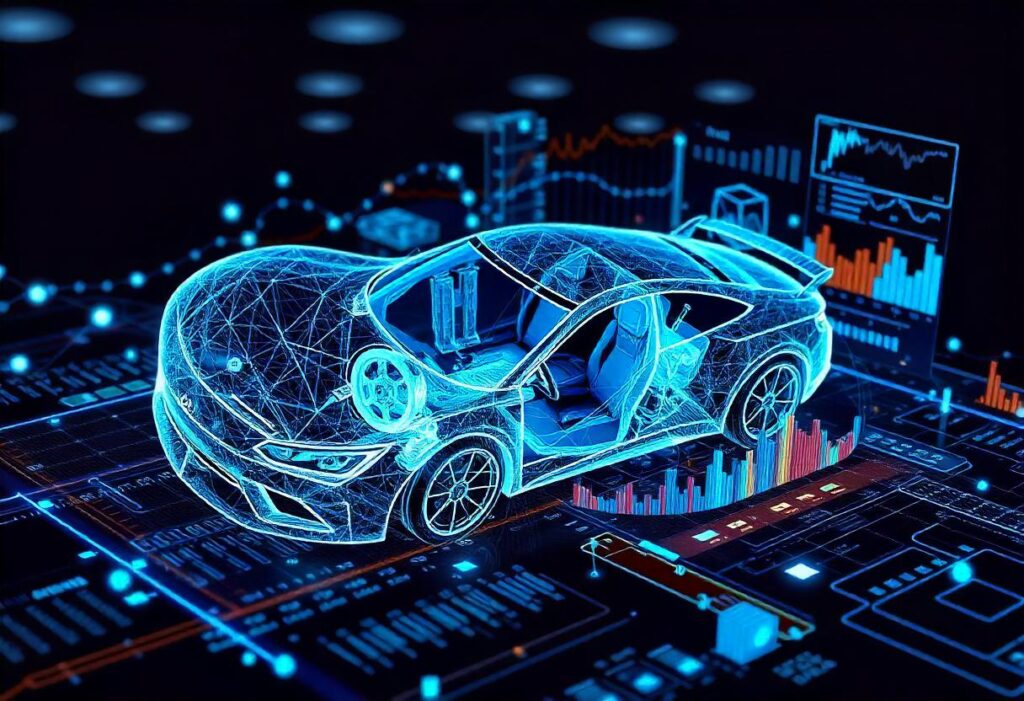
Data analytics is at the heart of transformation in the automotive sector, leveraging technologies like artificial intelligence (AI) and machine learning (ML) to enhance vehicle performance, quality, safety, and efficiency. The vast amounts of data analyzed range from customer behaviors and driving patterns to equipment performance, driving innovation across the industry. By utilizing data analytics, designers and engineers can produce higher-quality vehicles at reduced costs, improve safety features, and make advanced technology more affordable. Here are some key ways data analytics is reshaping the automotive industry:
Vehicle Design and Testing
AI-driven computer modeling plays a crucial role in vehicle design and testing by identifying potential issues and simulating various scenarios. This allows designers and engineers to address problems early in the development process and test vehicles under realistic conditions before production begins. This approach conserves resources, enhances safety measures, and accelerates the design and testing phases, ultimately resulting in safer end products.
Partially and Fully Autonomous Vehicles
Data analytics paves the way for the development of more connected and autonomous vehicles. Current technologies, such as lane assist, self-parking, Subaru’s EyeSight, LiDAR, and Tesla’s Autopilot, are examples of partially autonomous features already in use. Automakers continue to explore and expand autonomous capabilities to enhance safety and the driving experience.
Low Emission and Electric Vehicles
The push for sustainability is gaining momentum, with data analytics leading the charge. Big data and predictive analytics enable engineers to develop next-generation electric and low-emission vehicles more efficiently. For example, machine learning models can predict battery performance under various conditions, complementing traditional testing methods.
Benefits of Data Analytics in the Automotive Industry
The integration of data analytics offers numerous advantages to the automotive industry, including:
- Improved Sustainability: Data analytics helps optimize fuel efficiency and supply chain management, giving car manufacturers a competitive edge, delivering more value to customers, and boosting profitability.
- Supply Chain Management: Insights from multiple data sources provide a comprehensive view of supply and demand. Real-time information allows businesses to stay ahead of market trends and competition, while predictive modeling aids in applying successful past supply chain solutions to current challenges.
- Enhanced Quality Management: Data analytics enables suppliers to identify defects early in the manufacturing process, which is invaluable during prototype development and testing. This capability improves quality management throughout a product’s lifecycle.
- Increased Productivity: Data insights enhance productivity by providing greater visibility into manufacturing processes, detecting issues before they escalate, and identifying optimization opportunities.
- Improved Vehicle Quality: Manufacturers can use data analytics to design cars that meet consumer demands, identifying popular features and assessing viable price points.
- Better Marketing: Data analytics allows car companies to better understand their customers and develop more relevant marketing strategies. It is essential for personalizing content and creating targeted campaigns that boost brand awareness and sales.
- Optimal Dealership Placement: Data analytics helps determine the best locations for auto dealerships to maximize visibility and sales.
Trends in Data Analytics and Automotives
Several trends are shaping the future of data analytics in the automotive industry, beyond the well-known developments in autonomous and electric vehicles:
- Technology Upgrades: To fully leverage data analytics, car manufacturers and dealers must upgrade their technology and IT systems to collect and analyze data effectively. Digital transformation is necessary to integrate AI and ML into operations.
- Job Creation: While there are concerns about AI replacing jobs, digital transformation actually creates new opportunities. Employees need to upskill, and businesses must hire individuals with expertise in data analytics, predictive analytics, AI, and ML.
As the automotive industry rapidly evolves towards connected, electric, and autonomous vehicles, companies like Sothars are leading the charge with tailored digital engineering services. From innovative infotainment systems to advanced driver assistance systems (ADAS), their solutions set new standards for automotive excellence. Fast-growing tech companies partner with Sothars to outsource product development and drive growth, benefiting from their expertise in the tools and technologies powering the emerging economy.
